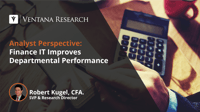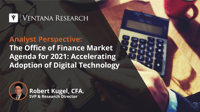Maersk is closing its TradeLens joint venture with IBM that began in 2018. It was intended to enable port operators, customs authorities, freight forwarders and importers to track containers and their contents. The system was designed to substantially reduce the inefficiencies and delays created by paper-based systems used for customs, trade finance, tariffs and taxes as well as supply chain and logistics management. The initiative was designed to cut supply chain latency by reducing the time...
Read More
Topics:
Operations & Supply Chain,
blockchain,
continuous supply chain,
operational data platforms
How payments are effected is an afterthought to many involved in a transaction, but flaws in this process can be a source of pain and frustration for those in the back office, especially in accounting and treasury. To improve the way payments are handled in business-to-business transactions, the once ubiquitous paper checks are giving way to electronic payments. This category includes credit, debit and virtual cards, wire transfers, as well as ACH (Automated Clearing House) transmissions that...
Read More
Topics:
CFO,
blockchain,
Payments
Ventana Research recently announced its 2022 Market Agenda for the Office of Finance, continuing the guidance we have offered since 2003 on the practical use of technology for the finance and accounting department. Our insights and best practices aim to enable organizations to operate with agility and resiliency, improving performance and delivering greater value as a strategic partner.
Read More
Topics:
Office of Finance,
Business Intelligence,
Collaboration,
Business Planning,
Financial Performance Management,
ERP and Continuous Accounting,
Revenue,
blockchain,
robotic finance,
Predictive Planning,
lease and tax accounting,
AI & Machine Learning,
profitability management
The need for a COVID-19 vaccination “passport” has prompted some to suggest using blockchain technology as a means of reliably verifying an individual’s status at an international level. There are precedents: for example, until smallpox was eradicated, all international travelers were obliged to carry an immunization record for that disease on a standard paper form to gain entrance to a country. With the likelihood that COVID-19 will remain endemic for many years, a reliable digital record with...
Read More
Topics:
Data Governance,
Information Management,
Data,
blockchain
A year of business uncertainty, lockdowns and operational disruptions forced finance and accounting organizations to adapt and change in many ways that are proving to be permanent. The need to operate virtually resulted in some organizations accelerating their adoption of technology, bringing them closer to achieving a transformation of the finance and accounting function: reshaping the department into an organization that is more forward-looking and strategic. Strategic in the sense of...
Read More
Topics:
Office of Finance,
Business Intelligence,
Data Governance,
Data Preparation,
Business Planning,
Financial Performance Management,
ERP and Continuous Accounting,
blockchain,
robotic finance,
Predictive Planning,
AI & Machine Learning
Ventana Research recently announced its 2021 market agenda for the Office of Finance, continuing the guidance we’ve offered since 2003 on the practical use of technology for the finance and accounting department. Our insights and best practices aim to enable organizations to operate with agility and resiliency, improving performance and delivering greater value as a strategic partner.
Read More
Topics:
Office of Finance,
enterprise profitability management,
Business Intelligence,
Collaboration,
Business Planning,
Financial Performance Management,
ERP and Continuous Accounting,
Revenue,
blockchain,
robotic finance,
Predictive Planning,
lease and tax accounting,
virtual audit,
virtual close,
AI & Machine Learning
I’ve written before about blockchain’s significant potential. A lot of the current discussion on the topic centers on cryptocurrencies and financial trading platforms, both of which are already in operation. However, my focus is on its applicability to business generally, especially in B2B commerce, where I believe there is significant potential for it to serve as a universal data connector. There’s also a great deal of potential for blockchain to provide individuals with greater power in ...
Read More
Topics:
Sales,
Human Capital Management,
business intelligence,
Business Collaboration,
Internet of Things,
Data,
Product Information Management,
Digital Commerce,
Enterprise Resource Planning,
blockchain,
candidate engagement,
collaborative computing,
continuous supply chain
The traditional office of finance has five main organs: accounting keeps the books; financial planning and analysis (FP&A) analyzes performance and manages the forward-looking activities of the company such as planning, budgeting and forecasting; corporate finance raises outside money; treasury takes care of the cash and bank accounts, and tax. The modern office of finance requires a sixth: Finance IT (FIT).
Read More
Topics:
Office of Finance,
Analytics,
Financial Performance Management,
Price and Revenue Management,
Digital Technology,
Operations & Supply Chain,
ERP and Continuous Accounting,
blockchain,
robotic finance,
Predictive Planning,
Conversational Computing,
revenue and lease accounting,
collaborative computing,
Subscription Management,
AI & Machine Learning
By itself, data isn’t useful for business; the application of analytics is necessary to transform data into actionable information. Data analysis of one sort or another has long been a core competence of finance departments, applied to balance sheets, income statements or cash flow statements. Today, however, Finance must go beyond these basics by expanding the scope of the data being examined to include all financial and operational information that can yield actionable insights. Analysis thus...
Read More
Topics:
Customer Experience,
Human Capital Management,
Marketing,
Voice of the Customer,
business intelligence,
embedded analytics,
Learning Management,
Analytics,
Collaboration,
Data Governance,
Data Lake,
Data Preparation,
Information Management,
Internet of Things,
Contact Center,
Data,
Product Information Management,
Sales Performance Management,
Workforce Management,
Financial Performance Management,
Price and Revenue Management,
Digital Technology,
Digital Marketing,
Digital Commerce,
ERP and Continuous Accounting,
blockchain,
natural language processing,
robotic finance,
Predictive Planning,
candidate engagement,
Intelligent CX,
Conversational Computing,
Continuous Payroll,
revenue and lease accounting,
collaborative computing,
mobile computing,
Subscription Management,
agent management,
extended reality,
AI & Machine Learning
What’s the easiest way to completely immobilize a 500,000-ton ship?
Lose a sheet of paper.
The paperwork that accompanies international trade is a serious source of friction, inefficiency — and therefore cost — in supply chain execution. Trade documentation requires massive amounts of paper that today can be replaced by digital data. In 2018, Maersk, the world’s largest shipping company, teamed up with IBM to create TradeLens, a digital platform that utilizes blockchain technology as a...
Read More
Topics:
Office of Finance,
Continuous Planning,
Internet of Things,
Data,
Operations & Supply Chain,
Enterprise Resource Planning,
blockchain,
continuous supply chain



















